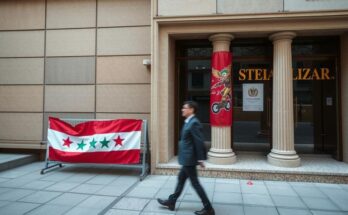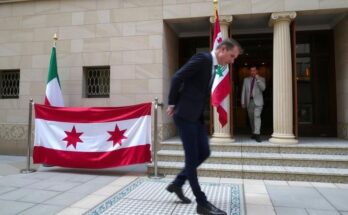Libya transitioned from an aid-dependent monarchy to an oil-rich republic following the discovery of oil in 1959. Under Muammar al-Qaddafi, who took power in a 1969 coup, the country sought Arab unity while facing international isolation due to its support for militant causes. The government’s violent response to the 2011 protests ultimately led to substantial political upheaval and civil conflict.
Libya’s transformation into an oil-rich nation commenced with the discovery of substantial oil reserves in 1959, which shifted its economy from dependency on international aid and military rent to a flourishing monarchy based on oil wealth. This newfound wealth facilitated a remarkable expansion in government services, infrastructure projects, and a rise in the overall economic progress and living costs in the nation. The political landscape of Libya dramatically altered in 1969 when young army officers led by Colonel Muammar al-Qaddafi executed a coup, overthrowing King Idris I and establishing a republic that staunchly advocated for Pan-Arab unity. This new regime sought to sever the close ties fostered by the monarchy with Western powers, particularly the United States and Great Britain, and implemented policies aimed at increasing Libya’s stake in its oil production and pricing. During Qaddafi’s leadership, Libya attempted to pursue Arab unity with neighboring countries such as Egypt and Sudan; however, these efforts generally faltered amid rising tensions and diverging interests among the involved governments. Qaddafi’s support for Palestinian and other regional causes further alienated Western nations and strained relations with several Arab states. By the late 1970s and early 1980s, Libya’s position weakened due to falling oil prices, leading to domestic discontent, which the regime suppressed through military might against dissenting opposition movements. Throughout the 1980s, Libya’s relationship with the United States deteriorated significantly, culminating in a series of military confrontations and economic sanctions stemming from accusations regarding its support for militant causes. The culmination of these tensions resulted in U.S. military actions against Libya and sanctions imposed by the international community due to its alleged involvement in terrorist acts, including the Lockerbie bombing. The lifting of international sanctions toward the early 2000s allowed Libya to re-establish diplomatic relations, with Qaddafi’s son, Sayf al-Islam, advocating for reforms to align Libya more closely with global norms. The political landscape of Libya experienced a critical turning point in February 2011, alongside widespread protests across the Middle East and North Africa. Demonstrators in Benghazi rallied against alleged human rights abuses, triggering a violent crackdown from security forces. The regime’s brutal response, characterized by widespread violence against civilians and repression of communications, resulted in significant international condemnation and marked the beginning of a tumultuous period of further unrest and civil conflict in the country.
Libya’s history is significantly shaped by its discovery of oil, which altered its economic structure from reliance on international aid to becoming a prominent oil-exporting nation. This transition fueled ambitious governmental expansion and modernization efforts but introduced complex political dynamics, particularly under Qaddafi’s leadership. Qaddafi’s ascent to power marked the beginning of an assertive era for Libya, characterized by a blend of revolutionary ideology and regional ambitions that often led to isolation from Western powers. The tensions between the regime’s goals of Arab unity and its violent suppression of dissent ultimately culminated in the uprisings of 2011, resulting in a profound restructuring of Libya’s political landscape.
In summary, Libya’s trajectory from an oil-dependent monarchy to a republic under Muammar al-Qaddafi illustrates the intricate interplay between natural resource wealth, political ambition, and social unrest. The quest for Arab unity and regional influence has often conflicted with international relations and internal stability. The revolt of 2011 stands as a critical juncture in Libya’s history, prompting changes that continue to resonate today, affecting not only the country but the broader geopolitical landscape of North Africa.
Original Source: www.britannica.com




